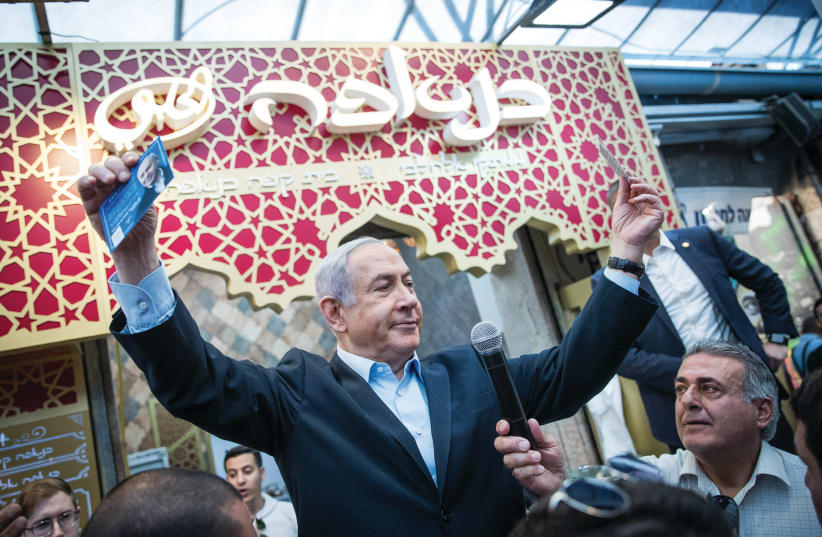Iman Cohen had a one-word answer when asked who she planned to vote for Tuesday and who she has supported in the last three elections.
“Bibi.”
The black-haired 29-year-old in jeans dropped his name easily and quickly, barely looking up from her phone as she sat on a bench in the small outdoor mall in the West Bank settlement of Ariel.
Just a few feet away a teenager manned a small plastic table, hoping to sway voters to support the Religious Zionist Party head Bezalel Smotrich.
But for Cohen, there was “only Bibi.” It was not one issue in particular that drew her to him, but the man himself, because “he is special.”
Eleven years in power, having brought Israel out of the pandemic with an exemplary vaccine program that has drawn global envy, and having finalized four normalizing deals with Arab states, Netanyahu is heading into tomorrow’s election with high odds of significantly besting all his rivals.
This was supposed to be the election of “anyone but Bibi.” Frustrated voters, fed up with lock-downs, were expected by his opponents to have been so bent on ousting Netanyahu who has corruption charges pending against him and who is almost famous for undelivered promises that they would rally around a promising rival.
Pending crises with the US on Iran and West Bank settlements, the specter of missiles from Israel’s northern and southern borders, should have only given Netanyahu’s opponents fertile ground to hammer home a defeat.
In the last three election cycles, Netanyahu fought for every vote, just to keep ahead of his chief rival Alternative Prime Minister and Defense Minister Benny Gantz. In the April 2019 elections, the two men tied. In September 2019, Gantz had 33 mandates to Netanyahu’s 32 seats. A year later in March, it was Netanyahu who came out ahead with 36 mandates to Gantz’s 33.
In each election, Netanyahu campaigned to be the largest party, to ensure that he would have the first shot to form a government.This time around, the polls have given him a ten-mandate margin over his centrist rival Yair Lapid of Yesh Atid, the largest such show of power since Netanyahu began in his 11-year tenure.
Netanyahu’s concern in the final hours of his campaign is less about popularity than voter apathy, less about a mandate to lead and more about a mandate to govern.
But it’s not just Netanyahu’s stature that has grown. This election is the first election in Israel’s history that has not clearly been about a Right and Left rivalry or even a Right and Centrist rivalry, but rather about a Right-wing rivalry, because that is how big the Right has grown.
In all three of the previous elections during 2019 and in 2020, it appeared that the choice was between a right-wing Netanyahu government or a centrist Gantz-led government.
But at no point were there enough parties considered to be right-wing to actually form a coalition, that is once one discounts Liberman’s Yisrael Beytenu. In the past, Netanyahu would always have had to bring in a non-right party, if he hoped to form a government.
THIS TIME around, however, polls have predicted that the Israeli voters have swung right-ward, so much so that an additional 20 or more mandates could go to two rival right-wing parties, Yamina led by Naftali Bennett and New Hope headed by Gideon Sa’ar. Both men are gunning to bypass Netanyahu, to form a right-wing-led government, led by whichever party is largest. The polls have not shown that this is feasible.
Still, the rivalry between the three parties has dominated election coverage, drowning out Lapid and smaller left-wing parties.
In Netanyahu’s fantasy scenario, not proven possible by the polls, enough votes would go to his party, two ultra-Orthodox parties Shas and United Torah Judaism, as well as to the smaller right-wing party of the Religious Zionist led by Bezalel Smotrich, such that he could immediately form a coalition.
But in a more reality-based scenario, Netanyahu is hoping that once the dust settles, that he could bring in at least Bennett’s Yamina Party to his coalition, to allow him to govern. Bennett has not ruled this out.
It would be a government with parties that all share similar political philosophies enough to provide the possibility of a stable government.
Should he fail, then the option to form a government would go to Lapid, but he can only likely be successful if he can arrange for parties with widely opposing views to sit together in one coalition based on the singular goal of ousting Netanyahu.
For this to work, Meretz which believes in a two-state solution at the pre-1967 lines would have to sit with Bennett, who does not believe in a Palestinian state. And they would have to do so under a government led by centrist politician Lapid.
On top of that, Lapid would have to bring Israeli-Arab parties into the coalition, a move that Gantz balked at and which has never happened in Israel’s history.
To make that non-plausible scenario even less likely, neither Bennett nor Sa’ar want to sit in a Lapid-led government.
Some on the right are floating an alternative scenario in which – once both options fail – Bennett or Sa’ar, could sway parties to support a coalition under their leadership to form a coalition and thus avoid fifth elections.
Either way, unless there is a dramatic shift in the polls, this election has shown that while the Right might not be able to form a government, it can increasingly draw on voter support. If that trend continues, a right-wing coalition is only a matter of time, whether in this election or the next.
